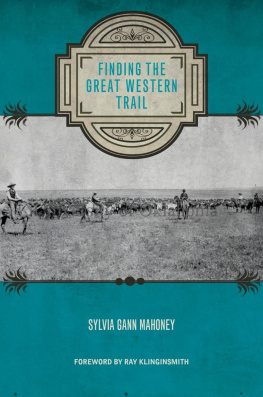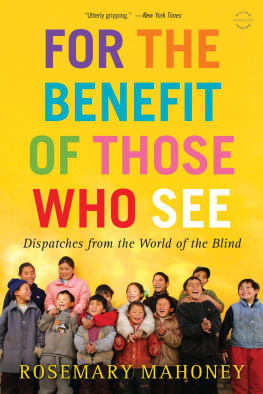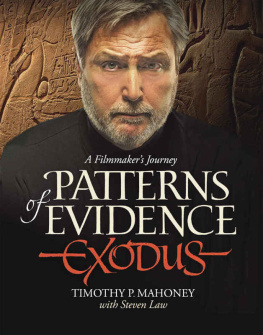In accordance with the U.S. Copyright Act of 1976, the scanning, uploading, and electronic sharing of any part of this book without the permission of the publisher constitute unlawful piracy and theft of the authors intellectual property. If you would like to use material from the book (other than for review purposes), prior written permission must be obtained by contacting the publisher at permissions@hbgusa.com. Thank you for your support of the authors rights.
To get back to the crutches, the truth about them is that they worry the onlooker more than the user.
N ot long ago I accompanied my boyfriend to Jerusalem for his laser eye surgery appointment. From Cyprus, where Aias lives, Israel is a forty-minute flight; youve hardly taken off from Larnacas tiny airport before youre skidding to a landing again at Ben Gurion Airport in Tel Aviv. The surgery took place in the private clinic of an Israeli ophthalmologist of considerable reputation. This ophthalmologist doesnt smile much, but his mouth is slightly lopsided in a way that makes him look perpetually on the verge of a smile. He looks as though he is privately enjoying a mildly amusing joke, although after spending twenty minutes in his company one suspects there really is no joke, its just the way his mouth is. He is short and stocky and neckless, and though his eyes are small and set close together, and though he doesnt truly smile, there is warmth in his face. He walks slumped a bit to the right, as if he has too much ballast in his starboard pocket, and moves through his clinic in a dogged way, like a weary commuter trudging through Grand Central Station at rush hour. His pending smile notwithstanding, I got the distinct sense that the surgeon was thoroughly bored with his job. At any one time there were approximately fifteen patients sitting in his waiting room, waiting for a first consultation or waiting for their surgeries or waiting, eyes bandaged, for their follow-up appointments. Each time I found myself in this room (I found myself there on three separate occasions), I could not refrain from counting the number of patients and doing a little mathematical calculation. If Aias was paying four thousand euros for his surgery, then the others probably were too. 15 x 4,000 = quite a lot. The ophthalmologist was possibly bored but certainly rich.
In first consultation, the surgeon explains the process with sentences he has used hundredsperhaps thousandsof times before. His style is sleepily deadpan, which somehow lends him an air of incontrovertible authority. Probably because he is required to, he offers a brief overview of the possible negative outcomes of the procedure, that one-in-a-million chance that you will emerge from his surgery worse off than when you went in, that wholly far-fetched possibility that you might come out of his surgery not just your same old presbyopic self but plumb blindor, if not blind, then at least optically diminished in one way or another.
After detailing these disturbing possibilities, the surgeon looks at you and blinks dryly, waiting for your horrified reaction. The dry blinking is a prompting of sorts, a cue, a wry indication that you have nothing to worry about, that it is extremely unlikely that you will go blind under his expert care. And so, somewhat intimidated by the entire enterprise, swept along by the rush of medical language and quite in the dark as to what it all means, a bit too polite to turn back now, the patient does not react in horror but simply nods and smiles with false detachment to show that, yes, of course, it would be ridiculous and perhaps a bit hysterical of him to think that he might come out of this costly surgery worse off than when he went in.
Before beginning his work on Aias that day, the surgeon asked me if I would like to observe the procedure from a small room adjoining the operating theater. From there, I would be able to see the surgery not only through a plate-glass window but also, highly magnified, on a television screen above the windowan exact broadcast of what the surgeon himself saw through his double-barreled microscope. Generally eager to observe just about anything new, greedy for any unusual experience, easily seduced by the wonders of modern technology, and lulled by the surgeons dispassionate manner, I said without thinking, Yes.
Of course, the moment I saw Aiass eyethat most vulnerable of organstremblingly huge on the screen, I felt that perhaps I had made a mistake in choosing to observe. Magnified a thousand times, the eyelids looked like desert dunes, the lashes like wind-tossed palms, the creases in the skin like a hundred parched arroyos. The rims of the enormous lids were raw and pink, damp and very tender-looking, the blue iris so immense it looked astral, like an exploding star, and the crimson blood vessels were dense and tangled as tree roots. How horribly exposed that eye appeared, how creepily suprahuman. In a sympathetic reaction of discomfort, my own eyes began to blink and water.
Presently a sort of screen slid across the eyeball, like a paper-thin sheet of ice, and then it crumpled and the eye was bathed in a foam of crystalline bubbles that slowly dissolved. Next, a metal clamp appeared, dug deep beneath the edges of the upper and lower lids, and pried them wide apart. And then a spade-shaped scalpel blade moved into view, hovering half an inch above the glittering eyeball. At the sight of this razor so close to the eye, I felt my face clench into a grimace, and my right hand leaped involuntarily to my throat in a nonsensical gesture of self-defense. I had made a mistake in choosing to watch, but having agreed to do it, I could not look away nowit was a matter of both stubborn pride and obsessive curiosity. The tip of the scalpel pierced the cornea at the edge of the iris and began to carve its way around the brilliant blue circumference.
I am not a squeamish person, but at the sight of this piercing it was all I could do to keep myself from shrieking and running out of the room. (The cornea, the transparent film that protects the iris and the pupil, is by the way one of the most sensitive tissues of the human body, packed with so many hotly vibrating nerves that the slightest intrusion produces an explosion of excruciating pain. If you havent gleaned this fact from your own lifes experience, you are an unusual person indeed.) With a small hook, the surgeon lifted the clear circular flap of cornea that he had, but for a small connective strand of tissue, cut free from the eyeball, and flipped it up, like the nearly severed lid of a tin can. The black pupil at the center of all this activity continued to stare straight ahead, spookily, not moving a fraction of an inch left or right, as if mesmerized by visions of an apocalyptic future.
I looked away from the screen and through the window into the operating room. The surgeons back was to me. Dressed in a sky-blue robe and puffy blue shower cap, he was hunched over his microscope, his two small eyes pressed to its eyepieces, while a big-hipped nurse stood slightly behind him in the posture of a lobsterelbows crooked and lifted slightly away from her body, gloved hands raised near her ears, and a swab of cotton pincered between the thumb and forefinger of each hand. Several inches beneath the bottom lens of the microscope, Aiass face was bathed in a pool of intense orange light. The surgeons gloved hands basked and darted in the pool like fish in a tank. More disturbing things happened in this surgery: drops of liquid were flung rudely into the eye, cotton swabs were raked across the eyeball, an intensely bright and vibrating laser strobe light circled around and around the dilated pupil, and all of this in a manner that seemed blunt and savage. It was like watching a seal pup being torn to shreds by a ravening shark.











